 | |
Bosnia and Herzegovina | North Macedonia |
|---|---|
The relations between Bosnia and Herzegovina and North Macedonia are very good, without any open issues between them. [1]
 | |
Bosnia and Herzegovina | North Macedonia |
|---|---|
The relations between Bosnia and Herzegovina and North Macedonia are very good, without any open issues between them. [1]
Until 1991, North Macedonia and Bosnia and Herzegovina were both constituent republics of the Socialist Federal Republic of Yugoslavia. When Yugoslavia started disintegrating, North Macedonia declared independence from Yugoslavia in September 1991. Bosnia and Herzegovina declared its independence in March 1992. Diplomatic relations between the two countries were established on 12 May 1993. [2]
North Macedonia and Bosnia and Herzegovina share the common goal of accession to the European Union. [1]
North Macedonia is a European Union candidate country since 2005 and awaits a date for the start of accession negotiations. It also met the criteria for joining NATO and became a member on March 27 2020.
Bosnia-Herzegovina has the goal of joining NATO as well. In 2008, it signed the Stabilisation and Association Agreement with the European Union.


The foreign relations of North Macedonia since its independence in 1991 have been characterized by the country's efforts to gain membership in international organizations such as NATO and the European Union and to gain international recognition under its previous constitutional name, overshadowed by a long-standing, dead-locked dispute with neighboring Greece. Greek objections to the country's name had led to it being admitted to the United Nations and several other international fora only under the provisional designation Former Yugoslav Republic of Macedonia until its official and erga omnes renaming to North Macedonia, a name under which it is now universally recognised.

Since the breakup of the Socialist Federal Republic of Yugoslavia in the early 1990s, the foreign policy of the newly established Federal Republic of Yugoslavia was characterized primarily by a desire to secure its political and geopolitical position and the solidarity with ethnic Serbs in other former Yugoslav republics through a strong nationalist campaign. While the country was involved in Yugoslav Wars and therefore exposed to several rounds of devastating sanctions against Yugoslavia this involvement was often denied for political or ideological reasons. In the initial period Federal Republic of Yugoslavia unsuccessfully aspired to gain international recognition as the sole legal successor state to SFR Yugoslavia, the country which was one of the most prominent foreign policy subjects during the Cold War.
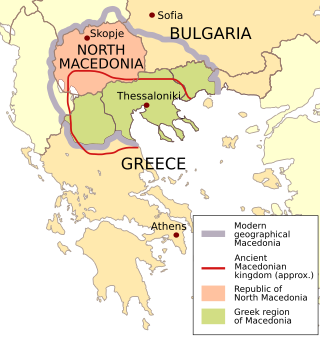
The use of the country name "Macedonia" was disputed between Greece and the Republic of Macedonia between 1991 and 2019. The dispute was a source of instability in the Western Balkans for 25 years. It was resolved through negotiations between Athens and Skopje, mediated by the United Nations, resulting in the Prespa agreement, which was signed on 17 June 2018. Pertinent to its background is an early 20th-century multifaceted dispute and armed conflict that formed part of the background to the Balkan Wars. The specific naming dispute, although an existing issue in Yugoslav–Greek relations since World War II, was reignited after the breakup of Yugoslavia and the newly-gained independence of the former Socialist Republic of Macedonia in 1991. Since then, it was an ongoing issue in bilateral and international relations until it was settled with the Prespa agreement in June 2018, the subsequent ratification by the Macedonian and Greek parliaments in late 2018 and early 2019 respectively, and the official renaming of Macedonia to North Macedonia in February 2019.

Zoran Jolevski is a Macedonian diplomat and the former Minister of Defense of the Republic of Macedonia. Prior to his appointment as Minister of Defense, he served as Macedonia's Ambassador to the United States of America. In November 2008, he was appointed chief negotiator to the Macedonia naming dispute, and in 2011 he was appointed Ambassador to the United Mexican States and as Permanent Representative to the Organization of American States. He served as Secretary General of the late Macedonian president Boris Trajkovski from 2000–2004. He holds a Ph.D. in International Economy from Ss. Cyril and Methodius University of Skopje. He is married to Suzana Jolevska, and together they have two sons, Pero (1988) and Filip (1992).
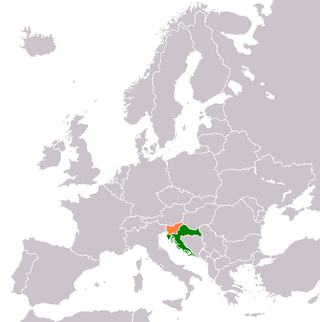
Croatia–Slovenia relations are foreign relations between Croatia and Slovenia. Croatia has an embassy in Ljubljana and two honorary consulates in Maribor and Koper. Slovenia has an embassy in Zagreb and an honorary consulate in Split. The countries share 670 km (420 mi) of common border. Relations between Slovenia and Croatia are generally considered to be friendly, but plagued with a series of unresolved border disputes and other vestiges from the time when both countries were the northernmost part of SFR Yugoslavia. Slovenia has given full support to Croatia's membership in the European Union and NATO.

Kosovo–North Macedonia relations are diplomatic relations between the Republic of Kosovo and the Republic of North Macedonia.

North Macedonia–Turkey relations are the bilateral relations between North Macedonia and Turkey. Both countries are full members of the Council of Europe and of the NATO. North Macedonia has an embassy in Ankara and a Consulate General in Istanbul. Turkey has an embassy in Skopje.

North Macedonia–Slovenia relations are foreign relations between the Republic of North Macedonia and the Republic of Slovenia. Both countries are members of the Council of Europe, and NATO. The two countries have very close political and economic relations. Once part of SFR Yugoslavia, the two republics declared independence in 1991 and recognised each other's independence on 12 February 1992. Diplomatic relations between both countries were established on 17 March 1992. Slovenia supports North Macedonia's sovereignty, territorial integrity, its Euro-integration and visa liberalisation.

North Macedonia–Russia relations are bilateral relations between the Republic of North Macedonia and the Russian Federation. North Macedonia has an embassy in Moscow and a consulate in St. Petersburg, while Russia has an embassy in Skopje and consulates in Bitola and Ohrid. Chargé d'Affaires of North Macedonia in Moscow is Olivera Čauševska-Dimovska, while the Russian ambassador in Skopje is Sergey Bazdnikin.

Both Montenegro and the Republic of North Macedonia are full members of the Council of Europe and of the NATO. The Foreign Ministry of North Macedonia states the two countries have excellent political ties, without any open issues between the two countries. The embassy of North Macedonia to Montenegro is located in the capital city of Podgorica. Montenegro's embassy in North Macedonia is also located in the country's capital city, which is Skopje. Also, Montenegro has an honorary consulate in the city of Bitola.
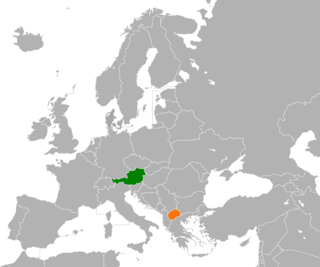
Bilateral relations exist between the Republic of Austria and the Republic of North Macedonia. Diplomatic relations between the two countries were established on 23 December 1994. Austria maintains an embassy in Skopje, while North Macedonia maintains an embassy in Vienna. Austria is an EU member and North Macedonia is an EU candidate.

North Macedonia–Serbia relations are bilateral relations between the Republic of North Macedonia and the Republic of Serbia.
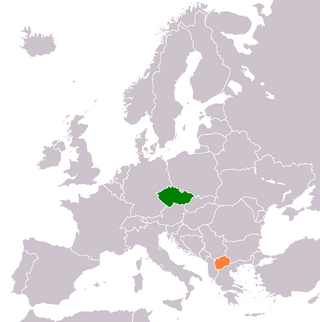
Czech Republic–North Macedonia relations refers to the bilateral political relations between the Czech Republic and the Republic of North Macedonia. North Macedonia has an embassy in Prague, whilst the Czech Republic has a consular agency in Skopje. Both countries are members of the Council of Europe, and NATO. Also Czech Republic is an EU member and North Macedonia is an EU candidate.

Bilateral relations exist between Greece and North Macedonia. Greece has an embassy in Skopje, and a Consulate General in Bitola. Similarly, North Macedonia maintains an embassy in Athens, and a consulate-general in Thessaloniki. Both countries are members of the Council of Europe and NATO. Greece is an EU member and North Macedonia is an EU candidate.

Bulgaria–North Macedonia relations are the bilateral relations between the Republic of Bulgaria and the Republic of North Macedonia. Both countries are members of the Council of Europe, and NATO. Bulgaria is a member of the European Union. Bulgaria was the first country to recognize the independence of its neighbour in 1992. Both states signed a friendship treaty in 2017. North Macedonia has been attempting to join the EU since 2004, while EU governments officially gave their permissions to enter accession talks in March 2020. Nevertheless, North Macedonia and Bulgaria have complicated neighborly relations, thus the Bulgarian factor is known in Macedonian politics as "B-complex".
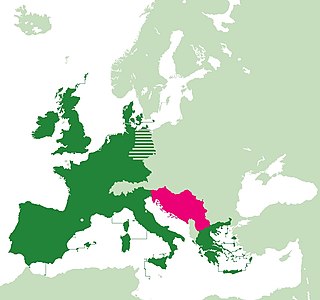
From the establishment of the European Economic Community in 1957 until the breakup of Yugoslavia in the early 1990s, thus during the Cold War period, the Socialist Federal Republic of Yugoslavia was the first socialist state to develop relations with the organisation. Notwithstanding occasional and informal proposals coming from both sides, Yugoslavia never became a full member state of the EEC.

Turkey–Yugoslavia relations were historical foreign relations between Turkey and now broken up Yugoslavia.

North Macedonia–United Kingdom relations are the bilateral and diplomatic relations between the Republic of North Macedonia and the United Kingdom of Great Britain and Northern Ireland. Both countries are members of the Council of Europe and NATO.

Croatia–North Macedonia relations are foreign relations between Croatia and North Macedonia. Two countries established diplomatic relations on 30 March 1992. Croatia is represented in North Macedonia via its Embassy in Skopje and honorary consul in Strumica while North Macedonia is represented in Croatia via its Embassy and the Cultural and Informational Center in Zagreb as well as consulate in Rijeka and honorary consul in Zadar. Croatia supports North Macedonia's European Union membership. Before their independence in early 1990s, both countries were constituent republics of the Socialist Federal Republic of Yugoslavia as the SR Croatia and SR Macedonia respectively. Croatia was one of the first countries in the world to recognize the independence of the country during the period in which Zagreb itself awaited international recognition. During the long-lasting Macedonia naming dispute (1991-2019) and before the signature of the Prespa agreement Croatia was the first country in the world to recognize North Macedonia under its constitutional name of the Republic of Macedonia instead of appellation "the former Yugoslav Republic of Macedonia". Today, both countries are full members of the Council of Europe, and of the NATO. Croatia is an EU member and North Macedonia is an EU candidate. Since 2006 North Macedonia is a member state of the Central European Free Trade Agreement while Croatia was a member of the area between 2003 and 2013. Croatia strongly supports accession of North Macedonia to the European Union and also supported its NATO membership, being one of the first countries to ratify the membership protocol. Trade between the two countries reached 221 million euros in 2020.

Germany–North Macedonia relations are the diplomatic relations between Germany and North Macedonia. The Foreign Office of Germany describes the relationship between Germany and Northern Macedonia as good. Both states are members of the Council of Europe, NATO and the Organization for Security and Cooperation in Europe. Germany is a member, North Macedonia is a candidate for accession to the European Union.